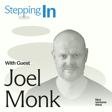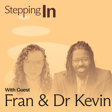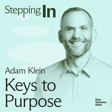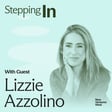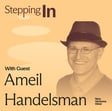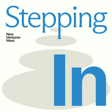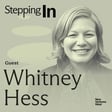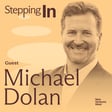Become a Creator today!Start creating today - Share your story with the world!
Start for free
00:00:00
00:00:01

Coaching as a Parent
Catherine Bronnert DeSchepper, NVW graduate and founder of Interweavers, joins Adam to talk about the myriad ways we can—and perhaps already do—integr
Transcript
Introduction by Adam Klein
00:00:08
Speaker
This is Adam Klein, Global Graduate Director, faculty member at New Ventures West.
Exploring Integral Coaching Issues
00:00:12
Speaker
This is episode 18 of our podcast Stepping In, a podcast where we delve into how integral coaching can address some of the most pressing issues we face as individuals, communities, and the stewards of our planet.
Interview with Catherine Bronert-Schopper
00:00:25
Speaker
In this episode, I talk with Catherine Bronert-Schopper about the intersection of integral coaching and parent development.
00:00:32
Speaker
Catherine is a certified integral coach, positive discipline trainer, Montessori administrator, and realization process meditation teacher. She facilitates workshops and coaches parents, teachers, and educational leaders, helping them create respectful environments where all children can thrive.
Integral Coaching and Parenting Skills
00:00:49
Speaker
Now, onto my conversation with Catherine. But as a place to start, I thought your question
00:00:58
Speaker
that you brought to the Learning Lab was a good one at the very beginning, which is, like, what is, how are the skills to be an integral coach in the skills of parenting? How are those the same? Or where do they overlap? How are integral coaching and parenting, what skills do they each bring?
Being Present with Children
00:01:20
Speaker
Well, the way this arose, I can go back to where, how the question emerged within me.
00:01:28
Speaker
is I was a guest coach at New Ventures West for session three with other integral coaches. And we began speaking about this day. And one of the integral coaches had just had a baby six weeks ago. And this person said, I would be such a different parent if I wasn't an integral coach.
00:01:55
Speaker
began talking about what they were doing as a parent, how they were sinking in with their newborn, not trying to change the state that their newborn was in, but just being there, just
00:02:11
Speaker
loving, being present, and then also taking their nervous system and just sinking down, really grounding so that they were centered. And then their mirror neurons could go off of their newborns, and their newborn could mirror off of them.
Secure Attachment and Independence
00:02:28
Speaker
And a teacher in the room said, this is integral coaching, what you're talking about. Being a coach and the parent are very similar. So that's what I really go back to is some of that
00:02:43
Speaker
Sometimes as parents, we can get really intertwined and intermeshed with our children and the boundaries for sometimes can feel less defined. And in the early, in newborn phase, that's actually, that's what newborns need a little bit is they need that sense of deep attachment. At the same time, we have to know that their sense of security and safety comes from us.
00:03:11
Speaker
and that we've got a center and know what center means and know what grounding means so that they can have this sense of security as they begin to venture out into the world. As a newborn, that's being able to be on a soft surface without being held.
Coach's Presence and Client Safety
00:03:33
Speaker
As an older child, that's being able to be with other caregivers besides the primary ones.
00:03:39
Speaker
Eventually, it's going to school. Eventually, it's leaving home and establishing partnerships, friendships, community separate from the family of origin. So that's what I come back to. You know, in New Ventures West, we talk a lot about how do you have the body of a coach? What does that mean? What is the body of a coach? Well, I think about the body of a parent. And that's what I want to bring into my coaching with parents is that
00:04:10
Speaker
Yes, there are skills, and I'm using the word competencies, but that help you be a better parent. But ultimately, what it comes back to for me is how does your body settle in? How do your nervous system, how do your emotions settle in to be with this other developing human being?
00:04:32
Speaker
And that's the same thing that we talk a lot about the body of a coach, developing the nervous system of a coach, developing the ability to be with another suffering without needing to fix it.
Resilience Through Pain
00:04:45
Speaker
And that's huge for parents, you know, being with a child suffering, be it as small as a bumped knee to the stage that I'm at right now of college rejections or
00:05:03
Speaker
How can you allow your child to experience pain and suffering without trying to fix it? Allowing them to build what some people call, and I'm forgetting the person I initially heard this from, but the disappointment muscle. How do you strengthen that capacity to be with your own suffering and pain, knowing that you will build resiliency? Not that this is conscious for children, but it's really important for them.
Parallels in Development
00:05:31
Speaker
Another way that I've heard this talked about, as you were talking, is the presence of a coach. The coach has to have some kind of presence, but it's related to what you're saying, I think, and how we do often speak about it at New Ventures West, the body of a coach, which is one where you're saying that
00:05:54
Speaker
The coach's nervous system is in a state that helps the client's nervous system also settle and relax so that some kind of opening is possible. The client feels safe enough for coaching to occur. That's what I'm hearing. It's also the same when we're parenting. If the child's nervous system can settle. And so just in coaching,
00:06:22
Speaker
the experience for a client of being truly seen in perhaps a different way of allowing capacities to emerge from these breakdowns or openings in life. I see it's the same for a child.
00:06:39
Speaker
that through the attachment to a caregiver, through that consistency and that being seen, that allows a child to step into the next level or stage of development, to try something new and scary, to step away and for
00:06:59
Speaker
in a parent, the child is constantly coming back. You know, I think about when a child's little, your circle that you're holding a child is pretty small. So I'm kind of, your arms are encircled with one another. And that's how an infant attaches and it's keeping them safe. And as a child grows,
00:07:21
Speaker
that circle gets bigger and bigger and bigger until eventually there's an opening. And so then the child can leave and come back knowing that that open embrace is always there. And that's a little, with coaching, it's a little different in that eventually the clients in New Ventures West kind of coaching, the client's going to go out into the world and may
Motivations Behind Behavior
00:07:45
Speaker
not keep stepping back into that coaching. But I think for some clients,
00:07:51
Speaker
especially clients who haven't had secure attachments in their own childhood, that experience of being seen, of being held in a relationship without being fixed or being wrong, the trust, the capacity to build resilience, the capacity to make mistakes. That's sort of what I see parents doing again and again and again and again.
00:08:20
Speaker
There's this beautiful phrase that we use and you just said it like, when a client is seen or when a child is seen. And I'm wondering, what do you think is going on there? Has that experience occurred? Obviously I have some thoughts bubbling up for me. And one of them actually is this iceberg analogy that you used. And I'm wondering if what sometimes what being seen means is that we see
00:08:49
Speaker
through to what's below the surface and then that has the person feel seen, child or client. So I'm an Adlerian. I practice what's called positive discipline.
Positive Discipline Approach
00:09:04
Speaker
And that's based off of Rudolf Dreyker's work and Alfred Adler as well as Jane Nelson and Lynn Law. The main, the basic tenants is that what motivates human behavior is
00:09:18
Speaker
we want to be connected and to belong. We want to have a sense of belonging and significance, and that that's the motivation. And that's actually quite different, and I'm kind of backing up to give you a sense of the iceberg right now, that's really different than what the dominant sense in at least the United States, I would say right now, way of understanding human behavior and that the dominant paradigm
00:09:43
Speaker
in my perspective, is one that we are motivated by seeking pleasure, rewards, and avoiding pain, punishment. In positive discipline, we say, that actually isn't it. We are motivated to be socially connected. A lot of the research that's coming out of brain science is actually verifying this, that we are social human beings.
00:10:11
Speaker
If we look at an iceberg of behavior where if you know an iceberg, the majority of the iceberg, we cannot actually see it's under the surface of the water. So what we see the tip of the iceberg when we're looking at human behavior. We could say the tip is the behavior we see. And so with children.
00:10:34
Speaker
we might see what one could call a misbehavior. So let's say a child continuously interrupts whenever you are on your cell phone. Okay. So that's the misbehavior. So in the dominant paradigm in the United States would be, okay, you need to set up a reward system every time the child doesn't interrupt when you're on the phone, you do something or set up a punishment. Every time they interrupt you, they lose something.
00:11:03
Speaker
And in positive discipline, we say, uh-uh, you see the misbehavior and then you go under the misbehavior to the base of the iceberg. And you look at what else may be going on. So you first might look at when did they eat? Have they gotten enough exercise? What about their sleep? Have they had enough connection? You might realize, oh, this is happening at the end of every day where we haven't seen each other all day.
00:11:33
Speaker
And then you look at what are some of the other needs? What need might they be trying to meet in an unskilled way? And so in their unskilled way, they may be seeking attention. They may be seeking power to feel a sense of belonging and significance. So for the parent to shift a misbehavior or pattern of misbehavior,
00:12:00
Speaker
Well, I'll encourage parents when I'm coaching them and then positive discipline will say, slow down, take a pause and think, go through the basic human needs of food, love, connection, exercise, sleep, think of those.
Growth Context in Parenting
00:12:17
Speaker
And then we have something we call the mistaken goals of behavior chart. And in a longer, like seven weeks I teach people it. I didn't teach it at New Ventures West. But the concept is still there of go under the iceberg
00:12:31
Speaker
And so if we go back to the child who continuously interrupts whenever you're on your cell phone, you might realize, okay, the child hasn't eaten no day. I can give them a snack as soon as I see them. I might realize, oh, we haven't connected. I'm not going to answer my cell phone when I pick them up from childcare at all. That is an off-limits time.
00:12:54
Speaker
And so you do rather than responding to the tip of the iceberg, the behavior, you may take some proactive moves as a parent to try to help the child meet that need in other ways. And you're not being permissive, nor are you being punitive. You're showing up seeing that whole child and that whole child's context.
00:13:16
Speaker
Right. Right. And what it feels like for the child when you're, because they're unconscious also about sometimes what this real need is. They're just doing their best. And when you could see through and meet what's deeper, that can help them feel like circling back, help them feel seen. Yeah. And then the settling effect that that can have. Right. I mean, just the softening. I
00:13:43
Speaker
And what that takes for a parent is it really takes a parent continually tuning in with themselves. And when they feel some reactivity, which if you continually get interrupted in that moment, you feel some reactivity to slow down, to notice that. And then to take a moment to think, how might I help the child shift? How might I help the child get more skills? How might I as a parent show up differently?
00:14:13
Speaker
Now, what I look at a lot, as a parent, our job, I'm going back to the circle again, is to set the context. It's to create an environment for a child to grow up within. And what I also come back to is we cannot make another person change. And we cannot make our clients change. We cannot make our children change. And whenever we try to do that,
00:14:39
Speaker
We're going to fail and it's going to become a power struggle and we're going to lose. Yes, I've been in that power struggle
Counter-Cultural Parenting and Coaching
00:14:45
Speaker
and it's very frustrating and it's like the unsophable force and the immovable object coming to me. I've been there too. I've been there too. So last night I almost stepped into one with one of my children and it was a pattern and I was tired.
00:15:04
Speaker
And I came so close. I was going down those stairs. And I stopped. And I softened in myself. And I realized I'm not going to help at all. And I shifted. And I went. So the other thing that I'm thinking about right now is the card. I'm going back and forth between New Ventures West and Parent.
00:15:30
Speaker
is wisdom and compassion, is that as a parent, you've got to combine both at all times. And I sort of stopped on the stairs and just thought, I'm not going to help her shift. This is not a helpful pattern she's in. And Meek showing up and going, I told you so, you need to buh, buh, buh, buh, buh, buh isn't going to help. I am discharging onto her.
00:15:57
Speaker
rather than showing up. So I shifted and I shared what I was feeling. I did a very simple I message of just naming my feeling, naming what was happening within me, naming my wish. And she gave me a huge hug and apologized for not keeping the agreement that we'd made and said she was really going to work on it.
00:16:25
Speaker
But I was this close to doing that power struggle, that reactive, that I'm right, I need to teach you. So the other piece that this for me comes back to is that the way I'm speaking about parenting and the way that we talk
00:16:46
Speaker
about coaching are quite countercultural. And so if we are going to practice this way of being in the world, it takes a lot of practice and a lot of giving ourselves time to be doing things with ourselves so that when we show up in these relationships, we can show up
00:17:14
Speaker
centered, grounded, resourceful to when that reactivity bubbles up, which it will, to notice it, to pause,
Community and Collaboration
00:17:26
Speaker
to choose a more respectful, compassionate, wise course of action in how we show up with our child or with our clients. But it's not easy and it's ongoing.
00:17:40
Speaker
Yeah, well, one thing it's occurring to me, as you said, countercultural is it's so the response and foundation for the response is countercultural. But it also what's occurring to me is means to be able to do that, like you're saying, there's practices and things in place, it requires a whole countercultural way of living to support that. So this is, you know,
00:18:03
Speaker
to use the word integrated. This is all integrated together so we can't live in a frenetic pace in an over-scheduled way like the world would have us do and expect to be able to respond in this way. It's a whole shift of how we see ourselves, how we see our lives that then opens this possibility.
00:18:28
Speaker
And the other piece it comes back to for me is about community. That it's really hard to do this if we're not doing it in community. You know, so for me as a coach, I need my community of other coaches who I can check in with about and what I'm doing with my clients or what is happening for me in my life as a human being and as a coach and as a parent.
00:18:57
Speaker
I have to have that community of people who are also trying to parent their children in a similar way. So I don't feel alone. And so my children also then can have some other adults who are showing up that way. Because when I say counter-cultural, but I actually want to circle back in that if we go back in history, way back, it's not counter-cultural in that as human beings, we
00:19:27
Speaker
Way back in time, we all gathered around the fire in circles. And our communities, if you look around the globe, communities were more collaborative and had in positive discipline what we call horizontal ways of being, horizontal ways of leadership. And at a certain time that shifted, and again, I'm noticing I'm doing something with my hand, to vertical, to hierarchy.
00:19:54
Speaker
But that actually isn't the way that human beings have always been. So at New Ventures West, I see that we're trying to bring in, bring back a new way of being human with one another. And what does true collaboration mean? What does leadership mean if you're not doing top-down?
00:20:15
Speaker
and right wrong. And so in families, that's what I'm also trying to bring is not everyone's the same. That's not the parents have a different responsibility. And, and, but everyone is worthy of equal dignity and respect no matter what the children should not be blamed or shamed.
Equality and Responsibilities
00:20:39
Speaker
They're not put down. We're on the same mutual respect level.
00:20:43
Speaker
but parents have different responsibilities. So at times they're going to say, I understand, I hear you. And the answer is no, rather than absolutely not. What are you thinking? No.
00:20:57
Speaker
No, it's the same in both instances, but they're really different in terms of the blame, the shame, the power differential. Yeah. Well, and the impact that it has on the person's psyche, their nervous system, the whole impact is way different.
Learning from Children and Clients
00:21:12
Speaker
Yeah. Well, this was a question I had for you was in this, you know, where everyone's meeting each other and we have different, what you said, different responsibilities, but our equality is never in question with each other.
00:21:24
Speaker
So one of the questions I wrote was, what?
00:21:28
Speaker
Can parents learn from kids coaches learn from client clients? Like what are we all contributing that we sometimes in a more hierarchical way or power oriented way cut ourselves off from because we don't, aren't open to, there's actually something here that I can learn from the way the child is in this or that how my child is in the world or maybe even my client. So just was curious about how you would answer that.
00:21:57
Speaker
I think it comes. So if we go into a coaching relationship as an expert, even though we may be a quote unquote expert in the content area that the clients seeking support in, but if we come in it, like right now I'm, I'm doing an embodied stance of an expert. If we come into it being like, we know we got this. I'm going to teach the client.
Balancing Structure and Freedom
00:22:27
Speaker
we may not even realize what we don't see in the client, in the client's dance of showing up in their environment, in their context. So we miss growing. The other piece of it is, so as a coach, as integral coaches, we have a structure. We have a way of
00:22:48
Speaker
working in engagements that's really helpful for us. It helps us understand other human beings, but it also helps the client feel safe, feel held. But within that structure, there's so much freedom. There's such a beautiful dance of co-creation that happens, you know, going into New Ventures West language, but when we offer a client a deeper narrative,
00:23:15
Speaker
And the client kind of goes, um, yeah, yeah, no. Like I once offered someone a Prius as a deeper narrative and he's like, uh, no, I'm actually, I'm a Tesla. And I was like, so tell me more, tell me more about how you're a Tesla versus a Prius. And he went into it. Had I not had I been like, well, actually what I meant when I said Prius and I kept my expertise, cause I'd understood the client in a certain way.
00:23:45
Speaker
I would have missed so much richness about who this client was and about myself and the world. But I was still using the New Ventures West structure, but then within it, I had to dance with him. With parenting, I think it's a lot the same way. Parents have to provide the structure. They have to provide the context of
00:24:13
Speaker
Every morning, we wake up, we have to brush our teeth, eat our breakfast, put on some clothing, hug each other at some point, and get out the door by eight o'clock. That might be the have-to. But then with a child, it can be co-created. How do these things happen? When do they happen? That's where I see it co-created. Then I think the piece with children that
00:24:43
Speaker
Comes in with coaching, but it's a harder one for grownups to do is the element of play. Kids and grownups, we need play. Like if you look at Daniel Siegel's healthy mind platter, play is on there for everyone.
Play in Learning and Development
00:25:01
Speaker
And so for parents, we need to step into that way of being and playing with our children.
00:25:09
Speaker
Because in that place, I'm sort of dancing with my body again, but there's this magic, this creativity, this way of being in the world that as adults we can lose. And if we can step into that with our children, wow.
00:25:25
Speaker
Yeah, I agree. It's such an important thing to be able to step into as an adult, to let go of that sense of having things to be so orderly, to enter the world of play, which is more dynamic and responsive. In some sense, I think with a lot of clients, it's helpful when there's over compensation for needing to control things.
00:25:50
Speaker
and stepping into play as a way of relaxing in and okay, no expectations here, no intended outcomes, I can just let go of all of that and how difficult that can be. I read something once by an author, it was a researcher and they said, you know, you can take your body, this is the exact quote, but it was something on the lines up. If you're wanting to learn something, it'll take you like a thousand repetitions to learn it.
00:26:18
Speaker
Unless you're doing it in the format of play, in which case it'll take 40. Because our receptivity, our ability to be more malleable and flexible, like they're saying, is so enhanced when we're in the spirit of play versus when we're, okay, I'm going to learn this and I'm going to do it and do it and do it. So much more work for our bodies and our minds to be able to learn that way. And if we have children, if we can see like, wow,
00:26:48
Speaker
This is, the word that comes to mind is opening, but this is a possibility for me, an opening, a way for me to step in with my children, where I'm showing up differently as a parent, but actually then again, I am learning from my children. I have a different capacity of showing up with myself, with others.
Understanding Deeper Motivations
00:27:11
Speaker
So one of the classic practices that I think many of us have given if someone has a infant or young baby is eye gazing. That can be a way of playing with an infant and being with them as they maybe turn away or say come back. Wow, what an opportunity to practice that with another person when you were parenting a young infant and to bring that into your ways of being and ways of showing up with others outside of parenting.
00:27:40
Speaker
Right, right. One of the other questions I wanted to ask you, so we've used this very helpful iceberg analogy. If there were any other frameworks that you found helpful that you use in your work with parents that could also be helpful in the coaching world?
Kindness and Firmness Balance
00:28:01
Speaker
The huge, the biggest one is the concept of being kind and firm at the same time.
00:28:11
Speaker
or of connecting with another person, but also being willing and having the capacity to at times offer corrections or redirections. But kind and firm at the same time is a huge one. And so my life partner is in business. And when I taught this to him, he said it just changed how he showed up with people who worked at his company.
00:28:41
Speaker
Because he just thought about, how do I be with them with kindness, with love? But how do I also communicate the boundaries, the expectations, the structures and values of our company? And if both show up, then I'm being really respectful to my employees.
00:29:03
Speaker
So with a parent, what sometimes parents think of is, okay, in this context, I need to be really kind. I need to be really soft. But in this context, I need to be firm. I need to lay down the law. And positive discipline, we say, uh-uh, you always show up with both intertwined. Always.
Values and Resilience
00:29:26
Speaker
And so when that becomes the compass,
00:29:30
Speaker
When that becomes your sort of guiding light and your check-in, that can be such a powerful tool because people either as parents or as leaders or as coworkers can check back in. Is the message of kindness coming through? Is the message of firmness coming through? How am I communicating that in my body, in my language, in the structures right now?
00:29:58
Speaker
Well, I'm appreciating that kindness in order to be kind, there has to be a sense of connection for true kindness to be present. Yeah. So how can I be connected and be true or hold integrity to values or boundaries or whatever it might be? And
00:30:18
Speaker
The difficulty though, that we can have with that, because it's hard, my sense is sometimes hard for us to stay in connection and be firm because we're fearful of the pain that might come. If this thing I'm about to say to you, upsets you, it's going to, the connection is going to be broken and I'm going to feel pain as a result. So I'll just not connect enough at all and be firm. Yeah. And that's what was coming up for me. And what is that?
00:30:49
Speaker
mean, you know, thinking about being with an employee, right, who you need to give some hard feedback to, or perhaps terminate a project or a child who you need to say, no, you may not go to that sleepover. And so in that moment, the employee, the child, both are probably going to be hurt. They may experience anger. They may experience disappointment.
00:31:17
Speaker
So coming back again to where we started the conversation, do you have the nervous system, the body, the way of being as a parent, as a coach, as a leader to hold that for them, knowing that if you rescue, if you go in and you say, oh, okay, actually, I'm sorry. You're so sad. I know you really want to go to that sleepover or, you know, let me see what I can do. Maybe I can juggle the budget.
00:31:47
Speaker
and there's a way we can keep doing the project. You're actually not helping because you're no longer staying true to the values of the family or the values of the organization. And to become human or to continue becoming human because it's never done, we have to have the capacity to be with our own suffering. And to build for children, I want children to build that resiliency muscle
00:32:18
Speaker
in the family. So if we go to that sleepover, if they can be really angry at me and feel that pain of missing out and then come back at some point and realize, okay, I understand why I cannot go. Then when they, they have them built up their capacity to be with difficult emotion. They also have realized why decisions are made, maybe in our family,
00:32:48
Speaker
You've got an exam that week and you don't get to go to sleepovers when you have an exam the following week. There's a reason for it. Then when that child is that employee who gets their project terminated, they hopefully will have the skill to experience those emotions, to be with disappointment. It may be in that meeting, handle it with some level of grace.
00:33:13
Speaker
And then later to realize, okay, as much as I want to do this project, I realize it doesn't actually align with the goals of where our division or our company is moving. Right. Right. And so that that's where the kind and for, yeah, it's huge. It is huge. It's what's coming up for me is what supports us in
00:33:42
Speaker
Well, as you said it, to be able to stay with our own suffering. So there's this way of like building our capacity for that. And it is a capacity that we can build. And I think some just even starting there can be helpful for people to see that it is possible to build capacity for being with suffering. And, um, and it will take time, but it's, it's doable and it's really,
00:34:12
Speaker
and a lot of voice connected to compassion. And can we do that with ourself? That's right. Can we then do that with others? And building that capacity, you know, not all of us got to experience that in our parent-child relationship when we were growing up. Right. But ideally, if we can be, again, I'm coming back to that container that parents provide, if we can give that to our children,
00:34:42
Speaker
That's huge, but if we haven't had that, then we have to really look into, well, how do I develop that for myself? How do I be with my own suffering, with other
David Brooks' Two Mountains Concept
00:34:56
Speaker
suffering? How do I develop the capacity to be empathetic or to be compassionate? And I'm going back, I'm thinking of your podcast you did with, I'm forgetting her name, right? With Whitney. Whitney. Yeah.
00:35:13
Speaker
The other piece, the other thing that's coming up for me right now, I don't know if you read it, but David Brooks just recently had an article about two mountain people. He has a new book coming out, but he talked about how he can sense that some people get on the path of life. This fits really well in with integral coaching and they think, okay, I'm going to be, uh,
00:35:40
Speaker
this, I'm going to be a lawyer, and they march on the path, and I'm going to have a family, and they keep doing it, and they do all the, quote unquote, right things. And he said he can sense when he meets people like that, and they often are pretty high achieving, and they're doing things. And he said there's this other kind of person he meets, the two mountain, where they've climbed the first mountain of success. Then something happened in their life, usually something that involved suffering.
00:36:12
Speaker
And all the assumptions, all the goals kind of fell away. And they reoriented and they experienced the suffering. And I'm probably putting words into David Brooks' mouth. I'm bringing probably integral coaching, but they then showed up in life from that point on climbing a second mountain, but in a really different way. And that's a lot of what we talk about in integral coaching. And so for adults who haven't had parents who've allowed them
00:36:40
Speaker
to experience moments of suffering, building their own resilience and capacity to be with their own pain in a safe family environment. For adults then noticing these second mountain moments and rather than shutting down and marching on, seeing the opening, the breakdown.
Exploring Deeper Motivations
00:37:02
Speaker
That's the huge piece.
00:37:04
Speaker
I did read this actually, and I think the title of it was something about meritocracy and the impacts of meritocracy. And it reminds me of when we were talking at the beginning of the iceberg and we
00:37:19
Speaker
a lot of examples of like the child interrupting a phone call or something and what is it that they're really needing and how it doesn't always need necessarily especially when we're older show up as this negative behavior in fact can be really positive behaviors but there's something underneath driving it that really has us stuck in suffering
00:37:40
Speaker
And I think it connects to his article here about, well, accomplishment, accomplishment, accomplishment. I'm accomplishing, I'm accomplishing. So clients will come to coaching on accomplishing and not satisfied. And I want some help accomplishing the right thing when really it's something completely different going on below the surface. Yeah. And so as coaches, can we see under the surface rather than if a, if a client comes to us saying,
00:38:08
Speaker
I need this promotion. When I get this promotion, everything will be different. I'll have more money. I can buy a house. My colleagues will treat me with the true respect I deserve. Some kinds of coaching. As a coach, a coach would say, okay, what do we need to do? You need to increase your speaking capacity, your leadership capacity. In New Ventures West, we're going to look under the iceberg.
00:38:33
Speaker
and maybe even question that initial request. Maybe not question is the wrong word. That sounds disrespectful. We're going to hold it in a broader context. Where is this emerging from? So that the client may or may not get that promotion, but the way they show up, there will be so many more possibilities for them.
Conclusion and Call to Action
00:39:03
Speaker
I'm Adam Klein and thanks for joining us. Please spread the news by sharing this podcast and social media and let us know what you think by emailing us at steppinginatnewventureswest.com. Until next time, take care.
00:39:38
Speaker
you
